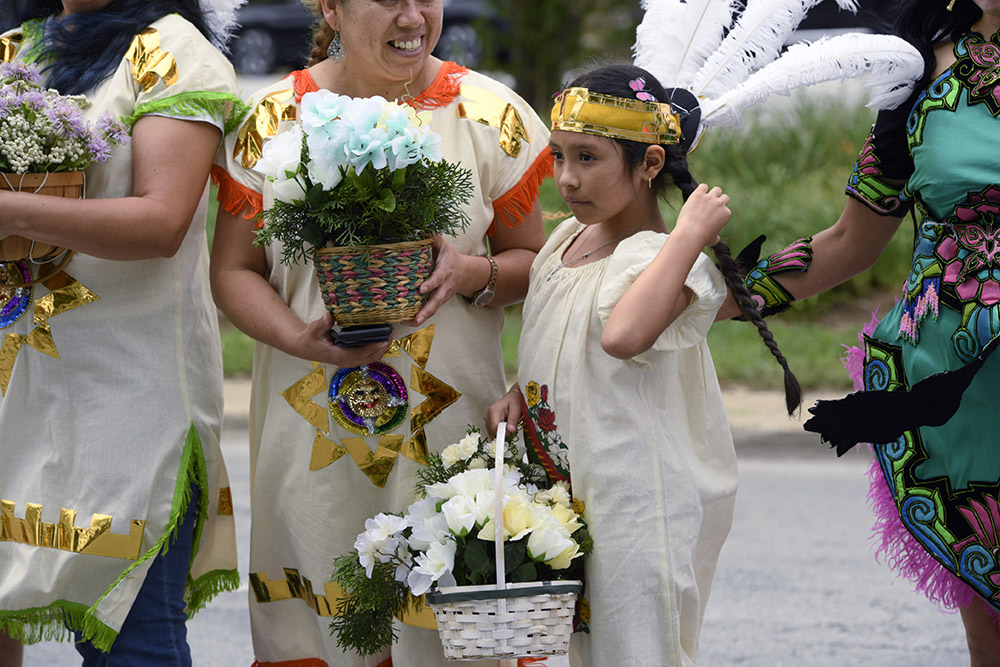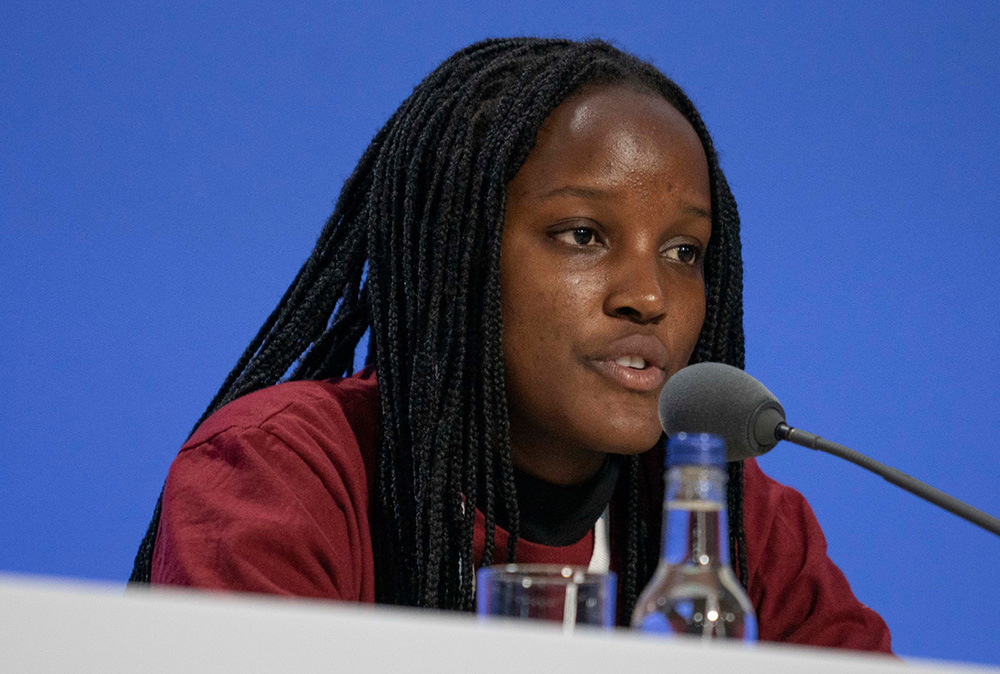
Members of Cristo Rey Parish prepare before the Parliament of the World's Religions Parade of Faiths on Sunday, Aug. 13, in Chicago. (AP/Paul Beaty)
Between Aug. 14 and 18 this year, the Parliament of the World's Religions is convening in Chicago, which hosted the first Parliament 130 years ago. The theme this year is "Defending Freedom & Human Rights," and although I'm not able to attend in person, what could emerge could change the future. Here's why.
For the last five years, I've dedicated my life to raising awareness of how the climate crisis is affecting the people of my country, Uganda, and other nations in Africa and throughout the Global South. My message has been twofold: First, the climate crisis is not a distant possibility; it has arrived. It's destroying livelihoods and killing people — often those with the fewest resources to combat it, and who bear the least blame for causing it. Secondly, the richest nations must stop investing in fossil fuels, take responsibility for their historic and current wrongs, and support the just and equitable transition that science and morality demand.
Five years ago, I was a business student working part time in my father's business. I shunned attention and public events. Yet, I've marched in the streets with tens of thousands of people, and I've stood on roadsides holding a handmade sign as part of Fridays For Future. I've given speeches and countless interviews; I've talked with politicians, met with business leaders, staged sit-ins, and called for a moment of silence for the victims of the climate crisis to steer the powerful into genuine action.

Vanessa Nakate speaks during a press conference on sustainable food production during the COP26 climate conference in Glasgow, Scotland, in 2021. (Courtesy of IFAD)
Although I've been fortunate enough to carry my message around the world, I've also been belittled, trolled and marginalized. It's hard not to feel overwhelmed by the facts of the crisis. It's hard not to feel helpless when you hear stories of those who've lost everything in flood or drought, or about girls whose education has been curtailed because their parents can no longer send them to school because of failed harvests. It's hard to tolerate the hypocrisy of rich countries who say all the right words but do nothing or — worse — continue their extractive capitalism at the expense of those they claim to support.
I've found strength in the courage of my fellow activists, demanding our elders stop mortgaging our future for fantasies of economic growth while the planet boils: threatening to collapse the Gulf Stream, glaciers and ice sheets melting faster than predicted, and the oceans reaching unprecedented temperatures.
But my greatest source of strength is my abiding faith in God, and his son, Jesus Christ. It is God who sustains my spirit and allows me, an introvert, to expose myself to ridicule to continue fighting on behalf of those who cannot fight for themselves.
Some readers might find my faith surprising. They might assume I'd either be indifferent or even opposed to Christianity. I get it: Many of us have found our love for Earth rejected by our faith traditions as paganistic or even immoral. Too often, Christian leaders have told their followers that "real" salvation takes place elsewhere and after this life ends; that the world is not ours to cherish or steward but dominate and subdue (Genesis 1:28).
That's not how I see it. As Psalm 24 states, "The earth is the Lord's, and everything in it." My God "so loved the world that he gave his only begotten Son" (John 3:16). How dare we lay waste to the beautiful planet he bequeathed us and which he promised never to destroy (Genesis 9:11)!
Advertisement
People of faith understand a higher mission and a greater calling. People of faith have organized to change what's wrong. Spiritual leaders have so much power: Wouldn't it be wonderful if the leaders at the Parliament came together to unite to save the only place we know that holds the breath of life — ours and the millions of animals who share it with us; the only planet God called "very good" (Genesis 1:31)?
So, what message do I expect from the delegates at the Parliament? One word: justice.
Justice that centers the rights of those without access to clean water, breathable air, fertile topsoil or a viable future because of this idolatry of fossil fuels. Justice that acknowledges the burden on those — almost all of them Black or brown — who weren't responsible for and (as yet) have no voice in determining the future of an extractive economy that could doom us all.
Justice that holds the corporations and politicians accountable — for what they've done and what they're not doing to shape a viable future. Justice that enables citizens to access affordable renewable energy to recover their dignity and reintegrate their food ways and the ecological knowledge of ancestors into their lives — and co-create genuine sustainability from the ashes of Big Oil. Justice that replenishes the watersheds, forests the hillsides, and cools the land and waters. Justice that atones and repairs.
Millions of young people — animated by the knowledge of what they're seeing and animated by faith in things unseen — are bearing witness. We're looking to those who profess, who've called from the wilderness for righteousness and a new vision, to do the same — to hold politicians and business leaders accountable, to march, to petition and to speak with one voice: Justice. For God's sake, justice!





